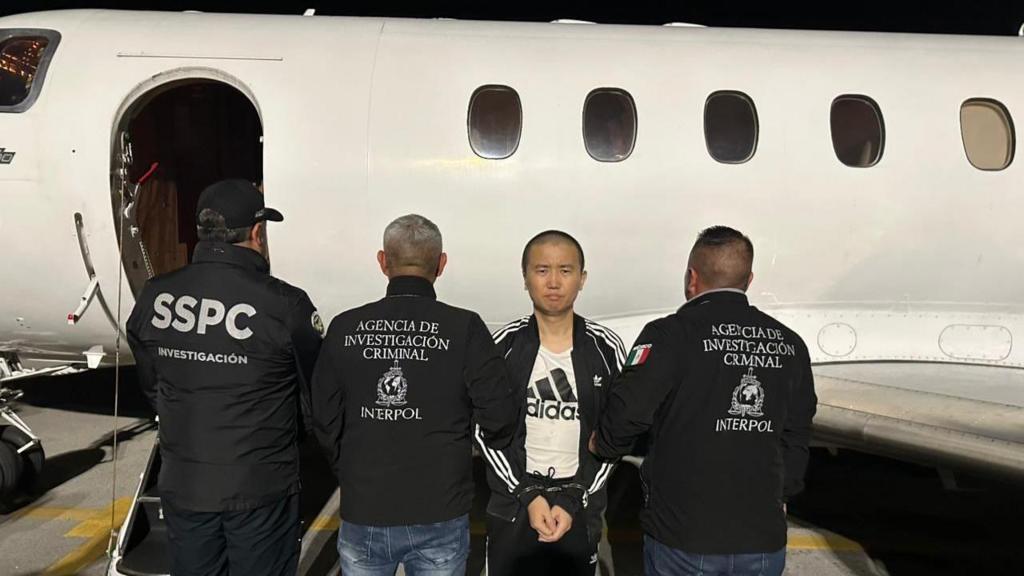“`html
In a statement released late Thursday, the Cuban Government announced the extradition of Chinese national Zhi Dong Zhang to Mexican authorities. Shortly after, Mexico’s top security official confirmed his subsequent extradition to the United States on charges of drug trafficking and money laundering.
This development marks the end of a protracted and audacious escape attempt by a high-profile fugitive.
Zhi Dong Zhang, known by aliases such as Brother Wang, Pancho, and HeHe, is accused by the U.S. Justice Department of orchestrating a vast international network involved in fentanyl trafficking and money laundering, spanning multiple countries including China, Mexico, and the United States.
The extensive list of charges against Mr. Zhang alleges his central role in the global drug trade. U.S. prosecutors and the Mexican Attorney General’s office accuse him of laundering millions of dollars in drug proceeds for both the Sinaloa Cartel and the New Generation Jalisco Cartel (CJNG), facilitating a global drug distribution network.
“Brother Wang can be seen as a key link between Mexican cartels and Chinese chemical companies in sourcing the precursor chemicals for fentanyl,” explained former DEA agent Mike Vigil, adding that he was also instrumental in converting drug funds into cryptocurrency.
If convicted, Zhi Dong Zhang faces the prospect of imprisonment in a high-security U.S. facility, mirroring the fate of other notorious drug kingpins like Joaquin ‘El Chapo’ Guzman and Ismael ‘El Mayo’ Zambada.
The circumstances leading to ‘Brother Wang’s’ apprehension in Havana involve a dramatic escape from house arrest in Mexico City, reportedly through a breach in a wall, followed by a private jet flight to Cuba and a thwarted attempt to enter Russia.
Zhi Dong Zhang was initially arrested in Mexico City during a joint security operation in October 2024. While initially held in a maximum-security prison, he was later granted house arrest by a judge – a decision that President Claudia Sheinbaum publicly criticized as “outrageous.”
Brother Wang’s escape echoed previous embarrassing episodes for Mexico, where a figure deemed crucial to drug smuggling managed to evade authorities tasked with guarding him. This mirrored El Chapo Guzman’s repeated escapes, which frustrated Washington before his eventual extradition to the U.S.
The recapture and extradition of Zhang can be attributed to a combination of circumstances, including a misstep in Russia and the strong security cooperation between Mexico and Havana.
Upon arriving in Cuba in July 2025, Zhang allegedly began plotting his next move to reach a country lacking an extradition treaty with the U.S., according to officials.
A direct commercial flight connects Havana to Moscow, and Zhang reportedly secured a seat using fraudulent documentation. However, these documents failed to pass Russian immigration authorities. Reports suggest that Russian officials did not initially recognize the significance of their detainee and subsequently returned Zhang to Cuba.
Upon his second arrival in Havana, Cuban security services were fully aware of his true identity.
Security analysts believe Cuban authorities held Zhang for several months for extensive interrogation before extraditing him to Mexico and, ultimately, to the U.S. Mexico’s Public Security Secretary, Omar Harfuch, expressed gratitude to Cuba for their cooperation regarding ‘Brother Wang,’ acknowledging that it averted further embarrassment over another high-profile escape.
As is typical following the arrest of an alleged kingpin, questions arise regarding the potential impact on the global drug trade.
Given that Brother Wang has spent the past year in prison, under house arrest, or on the run, Mr. Vigil suggests that his absence has already been felt within Mexico’s criminal networks.
“It’s really not going to have an impact as the cartels already have individuals working for them who can start to replace to Brother Wang”, says Mr Vigil. “Even in the case of El Chapo Guzman who was a much bigger figure, it had no impact on the global drug trade”, he argues.
During his first year in office, U.S. President Donald Trump has pressured his Mexican counterpart to increase efforts against fentanyl trafficking, and President Sheinbaum’s administration has responded accordingly. Drug seizures have significantly increased compared to her predecessor, and numerous convicted drug cartel members, including high-profile figures like Rafael Caro Quintero, wanted for the 1985 murder of a DEA agent, have been extradited to the U.S.
Her cooperation on fentanyl and undocumented immigration is believed to be a factor in President Trump’s decision to refrain from imposing trade tariffs on Mexico, as he has on other commercial partners.
Brother Wang’s extradition will likely be welcomed in Washington as a significant step in disrupting Mexican cartels’ financial operations. This, in turn, will likely strengthen the Sheinbaum administration’s standing in Mexico and reinforce their commitment to security cooperation with the U.S.
However, a lasting reduction in the flow of fentanyl precursor chemicals from China to the Americas will require more than the extradition of a single individual.
As the ongoing shutdown continues with no deal in sight, some federal employees are going without pay.
The advertisement will be paused from Monday so “trade talks can resume” with the US, Doug Ford says.
Washington has accused Gustavo Petro of allowing drug cartels to flourish during his time in office.
The deployment of the USS Gerald R Ford marks a major escalation in what the US says is a campaign to target drug traffickers.
Comparing the controversial advert quoting Ronald Reagan on tariffs with his original address.
“`

